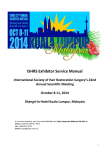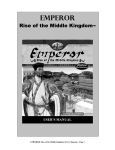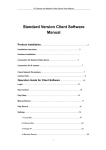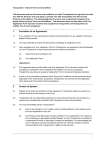Download A User's Manual to North Korea - Nordic Institute of Asian Studies
Transcript
A User’s Manual to North Korea
Matters and issues that shape relations between them and us
IIAS Annual Lecture, 19 September 2012
Geir Helgesen, director Nordic Institute of Asian Studies (NIAS), Copenhagen
In the beginning of this year, with a new and younger version of the Kim Dynasty
in place as supreme leader in Pyongyang, a blog hosted by the International Herald
Tribune, the global edition of the New York Times, suggested something worth
considering. The blogger, Mark McDonald, wrote: “Here’s a modest proposal for
peace on the Korean Peninsula: Give the kid a break.”
The reason was that the new leader, during another huge US and South Korean
military maneuver, kept his military in check. He did not retaliate, although
warships a few miles outside the North Korean coastline were firing live shells.
If North Korean warships did the same outside Incheon and Busan, would Seoul
show the same patience and forbearance, asks the blogger. Or would the US accept
if Cuba’s Raúl Castro staged war-games off Miami?
The comment is interesting in two ways: it changes the perspective from our
position to theirs, and consequently it underlines that there are at least two, but
usually more, parties in the equation.
A majority of Western, and many South Korean, observers interpreted the nonaction by Pyongyang differently, claiming that the new leader will act “when it
suits him, in ways unexpected by his target.” (Sung-yoon Lee, quoted from
McDonalds Blog).
The boy has not yet got his break, and I will give my version of the reasons why
changes are slow in our relations with North Korea, regardless which Kim we are
relating to.
1
Let me first present the setting of my lecture – and thus also myself – by quoting
from a book that I once read and lost, as it has influenced me a lot, actually more
than I was aware of, until I recently got hold of another copy in a second-hand
bookstore in Paris. The first paragraph of the Preface reads:
“It may be said of Korea that there is no country of comparable significance
concerning which so many people are ignorant. For hundreds of years the
Koreans sought safety in complete isolation, developing unique customs and
a distinctive way of life. Since the last quarter of the nineteenth century,
however, they have suffered deeply in the discovery that a nation cannot
sustain its independence if it will not share in the general development of
civilization. Shocked by violent Japanese, Russian, and American
occupations, the Koreans now struggle for the restoration of their liberty and
national dignity. As that effort, with its far-reaching implications, can affect
the whole world, it has seemed desirable that the characteristics of Korean
culture and the circumstances which led to their development should be
made available, particularly to those whose obligation is the welfare of the
sorely beset Koreans.” (Osgood 1951, p.v).
This was written in 1950, the year I was born, and published the year after. It is the
preface of Cornelius Osgood’s book: The Koreans and their Culture. The first
really serious book I read about Korea and its people.
Sixty years later Osgood’s comments still seem relevant. And his observations are
obviously much more relevant regarding North Korea than they are regarding the
South. Just right now the North Koreans suffer in the discovery that a nation – or a
half one – cannot sustain its independence if it continues to avoid the outside
world. And the shock of past occupations are maintained by an intense fear –
motivated or not – of foreign military attacks. The present struggle for national
independence and dignity make the regime over-emphasizing its military build-up,
at the expense of the life and welfare of their own population.
2
North Korea is not an easy case to tackle, but – as Osgood remarked in 1950 –
what happens on the Korean peninsula can have far-reaching implications and
affect the whole world. This is as true today as it was then.
I have promised to offer A User’s Manual to North Korea. The title might be
misleading, as I am not suggesting finding ways to “operate” North Korea. But a
new way to approach and relate to North Korea is needed, as most attempts up
until now have failed or been inadequate. The subtitle of the lecture is: Matters and
issues that shape relations between them and us. By this I want to signal a need to
acknowledge that a focus on North Korea alone, its ideas and actions, is a dead
end. The approach has to be relational. Not even North Korea exists in a vacuum
(even if this is what they for years have claimed to prefer.)
A very basic, but often ignored premise in our observation of others is that we use
a particular filter, acquired and developed through the process of upbringing (and
to some extent education). We are all provided with a mental manual that usually
enables us to manage our daily life. When we try to apply our acquired abilities to
understand the world far outside our local domain, however, it’s harder. It’s often
harder to make sense of what we see, hear or read about people and societies far
from home. This is then usually explained by their cultural traits, traits that differ
from ours.
While this is a banal observation, it is important for my argument to bear in mind
that a discussion about North Korea usually – almost always – is deprived of this
particular aspect. North Korea remains our Axis of Evil and Outpost of Tyranny,
although those particular phrases are currently out of fashion. Their difference, it is
inferred, is due to “brainwashing”. In our picture of them the North Koreans are
clones fabricated by evil forces. This description in different shades, from grey to
black, informs us through all kinds of media, about the Hermit Kim-dom. It renders
it difficult, bordering the impossible, to engage on equal or normal terms with the
North. So, let me make Osgood's words mine: it is still desirable that
characteristics of Korean culture and the circumstances that led to their
development are made available. And after that, it is to be hoped that those who try
3
to deal with North Korea remember to consider the impact of these cultural traits
on their thinking and actions.
I have already indicated that as observers we are also coloured by something.
Allow me therefore to share a couple of personal experiences in this field, before I
continue to challenge the mainstream views. The first one relates to the poster
announcing this lecture. I visited North Korea a number of times in the 1980s,
when foreign visitors were rare. When I then came to South Korea in 1988, I was
therefore perceived to be a kind of interesting person, not because anything I had
achieved, but of the simple reason that I had been in the North several times. I was
invited to share my experiences with staff from the Foreign Ministry in Seoul.
They had never been up North, but they knew everything. For instance that the
picture of the grey building one can see on the poster announcing this lecture was
nothing but a Potemkin village, it was fake, they said, only a facade, not a real
house.
Behind that facade, I told them, I had tea in the grand visitors' room, a place nicely
decorated with thick carpets. I even used the gents! In that fake house there were
flushing toilets and hot water to wash your hands. My hosts immediately changed
subject. They did not want their picture disturbed.
The other experience, hard to forget, happened during the same visit to South
Korea. I was invited to present my personal accounts from North Korea at a wellknown university. The lecture room was huge, and it was filled to the last seat, as
eye-witness impressions from North Korea seldom were offered. I started my talk
by saying: dear fellow scholars, it is important for me, visiting your beautiful
country, to share one strong impression with you: there are beautiful places in
North Korea too, and the North Korean people are very much like you, hospitable,
considerate, and nice….
This generated noise in the lecture room, and to my astonishment I saw the whole
first row, where the university president and distinguished professors were seated,
on their way out. I caught one sentence before the door slammed: “we are not
going to listen to communist propaganda.”
4
In both cases I was hurting emotions. Disagreement is not enough to make decent,
highly educated people break the etiquette, not in Korea, and hardly anywhere.
North Korea and emotions are interrelated. I will come back to this later.
This happened a quarter of a century ago, before the end of the cold war. Are such
experiences really relevant today? The unfortunate answer is yes. In the latest
magazine of the Danish Ministry of Foreign Affairs called Development, a letter to
the editor expressed fury, because the previous issue of the magazine had brought
pictures from North Korea showing daily scenes from Pyongyang, with ordinary
normal-looking people, instead of the hunger-stricken infants in nurseries, military
parades on Kim Il Sung Square or the slightly over weight, new young leader. In
South Korea 25 years ago it was not accepted to depict people in the North as
normal people, and today in our part of the world we have been so accustomed to
dreadful descriptions and pictures from the North that nothing else is tolerated. We
have been so used to see North Korea as a nightmarish, totalitarian, Stalinist,
inhuman place on earth, that even glimpses of normality are dismissed as fake,
untrue propaganda.
The angry letter to the editor of the magazine Development came from the
headquarters of the Christian Democratic Party in Denmark. They, as well, know
North Korea from the media, and became emotionally upset by seeing alternative
images.
A word about media is in place here. I am a critical user. But I’m also happily
sharing my ideas and views with the media. They are a curse and a blessing. We
cannot do without them (then we would find ourselves in the same situation as
most people in North Korea), but we could do without the worst examples. They
are powerful in selecting information and shaping our views. Regarding North
Korea, our media have to a large extent created an image which is a mix of what
can be observed and with how this is interpreted by intelligence agencies in the
West. By disseminating a very negative image only, the media contribute to
prevent a more pro-active Western approach to North Korea. As an experienced
foreign relations bureaucrat explained in Brussels: no serious European politician
will risk to see his name on the front-page insinuating his support for a Stalinist
5
dictator in Pyongyang. In this case, media really matters, which is why it remains
relevant for my presentation to discuss their role.
The personal experiences that I just shared with you are the reason why I believe
that a new “manual” is needed. Or, as also suggested above, one could say that the
existing manual to North Korea is problematic; it is worn out and needs to be
renewed and updated. All information about North Korea in our part of the world
seems to be filtered through the do’s and don’ts of such a manual. Suggested
matters and issues to focus on are the inhumane dictatorship with a family clan
monopolizing power, the oversized army and the clandestine nuclear development
for military purposes, testing of long range missiles, the dreadful human rights
situation with a focus on labour camps. Words like closed, aggressive,
unpredictable, inscrutable, unreliable and the likes are recommended. The general
advice of the manual is, always believe the worst and question positive
information, should it ever occur.
Even if such a manual is non-existent as an actual item to be found at every chiefeditor's desk around the world, media coverage of North Korea basically follows
the pattern I just suggested. An alternative is “the-make-fun-of-North-Koreaapproach”. Here images of leaders with a focus on funny hairstyles and bad dress
codes, eccentric tastes and evil habits, dominate. And finally there is the suggestion
of taking announcements from the propaganda outlets literally; translating word for
word statements are highly recommended, with hilarious results.
What most people know about North Korea comes from the media, that is why
they are important. Compared to its size and relative unimportance (in relation to
all its neighbours), that little country in the far North-East of Asia manages to
attract a lot of interest and the number of articles and TV clips dealing with North
Korea is impressive. It is a real “brand name”. Say the word and images come to
mind. Not nice images though, but still.
A longtime observer of Korea, Bruce Cumings, writes in his fascinating book:
North Korea, Another Country that “Judging from our media, North Korea is the
6
country every American loves to hate..” (Preface: viii). The media he mentions are
what are usually considered quality periodicals in the USA, such as The New
Yorker, The New York Review of Books, and Vanity Fair, and magazines such as
Newsweek, Time, The Economist, and U.S. News and World Report. With
occasional exceptions all of them, Cumings claims, print “uninformative,
unreliable, often sensationalized” articles on North Korea, which deceive rather
than educate the public. (xii) Cumings points at the reason why this is sad,
frustrating and destructive, with implications for international relations: “Given the
mimetic nature of our media, the same stories circulate endlessly; often they are
contemporary variations on the same old tales that have been around since North
Korea became our enemy sixty years ago..” (xii).
The bleak picture of the North is so massive that no one remains unaffected.
People at large, and in governmental ministries, in research councils and
foundations, business people and politicians, all receive the same gloomy and scary
description of North Korea, making it difficult for anyone to go against the tide. To
question what everyone can read, hear and see in any news outlet, is tantamount to
side with the bad guys, to support the enemy.
My experience as a North Korea observer is that to publicly question the image
that North Korea has attained in the West as a rogue state of the worst possible
calibre, necessitates simultaneous statements ensuring the audience that one does
not support the North Korean regime, its system, ideology or leaders. And even if
one is loudly and clearly stating this, and frequently repeats it, there is often a solid
portion of disbelief among the public. The “logic” seems to be: why should he
explain away their misbehaviour, or atrocities, if he isn’t siding with them?
Let me try to make my position clear, before I continue with some reflections on
alternative ways to approach and understand the topic of today’s lecture. Much of
the information circulated about North Korea contains, even if it is biased, also
reasonably reliable information. There was a hunger catastrophe in the 1990s, there
are labour camps in the North, the human rights situation is serious, the regime
7
allocates huge resources to a military build-up, and the people of that country are
deprived access to information about the outside world. And all these are reasons
why we should engage much more with North Korea. What is the alternative?
One can wish the system to disappear, to implode or explode, and very many
people do that, but it does not seem to work. In my professional carrier as a Korea
observer I have been told time and again, at least since 1989, that North Korea
operates on borrowed time. That the system would not be able to survive the
collapse of Soviet Union; the market reforms in China; Kim Il Sung’s death; the
hunger catastrophe in the 1990s; the stagnant economy; the economic, political and
military pressure of the combined US-South Korean forces; the ever intensified
UN embargo and other, for the system detrimental forces.
They are still around.
Maybe I should elaborate upon the question why I find it to be of the utmost
importance to find a better way to approach North Korea, as it is, and not as we
want it to be. There are two main reasons. The first is that the existing approach is
ineffective, to the extent that its results are negative, and relations are getting
increasingly worse. The second reason is the real serious one: by not changing
anything, we are, together with the leadership in Pyongyang, responsible for
continuing human suffering in the North.
The present situation in North Korea cannot be reasonably explained by focusing
on internal phenomena alone, be it ideology, politics or leadership. The ideology,
politics and leadership of North Korea have been created, developed and formed
based on internally given traditions and in relation to external influences and
pressures. No matter how it appears from the outside, the present reality of North
Korea is a socio-political system that forms a very strong structure, because it
makes sense to people at large. Insufficient provisions of basic daily necessities to
a majority of the population is clearly undermining societal consensus, but the
challenge is not detrimental to the system itself.
One external influence with some effects on the socio-political pattern is the
communist ideology that came to Korea via Japan, China and the Soviet Union.
8
However, the early Koreanization of this foreign ideology modified it and made it
fit Korean ideas and sentiments.
The external pressure with the strongest influence has been produced through the
hostile relations with the USA, Japan and most of the time also with South Korea.
The constant pressure from these three powers has to a large extent internally
legitimized priorities of the North Korean regime, such as their military build-up,
and to some extent even their hardline attitudes towards people perceived to be
enemies of the regime.
This is of course not mentioned in order to excuse suppression, but what I would
very much like to underline is, that not even North Korea is an either – or case. My
task as an academic observer of the Korean peninsula is not to side with one of the
two contesting parties. Many of the accusations against North Korea's regime are
justified by the regime's behaviour and actions, but despite this, or may be because
of this, we have an obligation to search for explanations that can shed some light
on why? We need to contextualize, we need to put cases into broader pictures, to
generalize, to search for historical roots and religious-philosophical links, and also
for psycho-social explanations, and not to forget, the impact of geo-political
economic and power interests.
It is not because such contextualization is absent in the media coverage, the
problem is that it is unstated. If it were articulated, we would have been aware of
the fact that North Korea usually is described and evaluated as if it was a part of
our world, that there is one and only one reality comprising the physical reality:
water, trees, stones, people….but also, and in particular how all this is perceived
and related to, how it is subjectively and culturally constructed and understood.
I do acknowledge, of course, that a stone is a stone, in Norway, where I was born,
as in Korea, the country I have been dealing with for the greater part of my life.
What I have observed, however, is that even stones may trigger different ideas and
feelings in these two parts of the world. It not only may happen, it happens all the
time, and this difference is significant. And it is something we need to be aware of
and take into consideration when interacting across cultures.
9
We don’t do that when we look at North Korea. The other countries in East Asia
may have distinct cultures, exotic ways worth while studying and experiencing, but
even tourists going to North Korea, interviewed about their reasons for doing so,
usually say: to experience the last communist dictatorship. The basic culture of
North Korea, the values and norms of the people living in that country, seem to
have vanished. North Korea is the East Germany of East Asia, only worse. The
grim political picture prevents us from seeing what may be underneath and behind
the surface. As long as this continues to be the case, we are almost as deprived of a
real picture of North Korea as the North Koreans are without a real picture of us.
They, however, are not to blame for their blindness, their leadership is. In our case,
I put some blame on the media. Few of them seem interested in digging a little
deeper than the scary surface. In our part of the world, however, we are in a
position to change that perspective. Personally I think that people like me and
many present here today have an obligation to share the background information
and insights we have reached through years of study to pave the way for another
approach, which I will try to do the remaining time of my lecture.
***
Returning to the new leader in Pyongyang and the blog I quoted from initially,
suggesting that “the boy”, that is Kim Jong Un, is given a break. Why is it not
happening? Why are we waiting for him to continue exactly where his father and
before him his grandfather stopped. Disregarding his restraints, his new (to North
Korea) style of talking directly to the people, talking about his obligations towards
them, walking around with his wife, suddenly providing a new role-model for
young North Korean girls? Disregarding all this because: we are waiting for him to
“provoke when it suits him”?
Many Korea observers and political commentators in the West continue to focus
on his person and an attempt to find indications for his expected bad character,
and this focus on him is disseminated to all of us by the media. Nothing much can
be revealed, however, by continuing this observation.
10
A way to find an answer might be, indirectly at least, to turn to what the social
sciences tell us about culture and society, culture and cognition, about crosscultural communication and about the importance of emotions in politics. And
from these insights we could evaluate relations between them and us. Let me try to
do that.
Based on a growing body of research in the field, we know beyond doubt that
cultures differ and culture matters. Different cultures are not alien entities, but
rather different ideas and positions on an extended line of continuity. The
generalizations, of which a culture consists, relate to a particular pattern that
characterizes a majority of the people under study. Even the most internationalized
societies maintain crucial aspects of a parochial political culture, and countries not
engaged in close international interaction, such as North Korea, will obviously
maintain stronger local and traditional traits.
North Korea has developed within more isolated conditions than most other
countries, isolated by others and by choice. It has transformed traditional values
and norms without altering some of the inherent concepts and understandings
relevant to society and politics. While Confucianism as such has been removed
from North Korean teaching, textbooks and daily political communication as a
stated social and moral ideology, it remains a fundamental basis for contemporary
ideology as well as political thinking and action. This development has been
possible in North Korea because of its isolation.
People everywhere are raised to understand and relate to society through specific
cultures, and the ensuing differences in world outlook must be taken seriously. In
some parts of the world, social morality promotes individual freedoms; in others,
people are taught to seek conformity. In some areas power is paternalistic and
dependency is a positive trait; in others, power needs to be checked and
dependency avoided. One can find spots on the globe where social emotions are a
central part of what holds society together; in others, emotions are relegated to a
space outside of the boundaries of politics. In some regions, collectivistic traits are
prevalent; in others, individualism prevails.
Frequently, East Asia and the Western world occupy opposing positions on what
could be termed the extended cultural continuity of human affairs. Western cultural
11
patterns are more or less loosely established and combined, compared to the more
strict and well-defined East Asian patterns. The North Korean case belongs to the
strict end of the East Asian pattern.
In the case of North Korea, childhood socialization in the family context, formal
teaching in educational institutions, and political and ideological propaganda all
have a common root, and the one is created to reinforce the other. Together they
constitute a resilient world view which can be very difficult to challenge. I have
found no better formulation of this phenomenon than the following quotation by
Han S. Park:
“Without interruption in the progression of socialization for several decades,
Juche has been able to deeply penetrate and assimilate itself into the mass
belief system. The degree of rigidity and saliency of beliefs may have
reached a point at which external disturbances may not easily cause
psychological dissonance.” (North Korea. The Politics of Unconventional
Wisdom p. 63).
By inventing Juche, the North Korean leadership decided that self-imposed
isolation was the best way of preserving national independence. The North Korean
people became targets for an intensive ideological socialization process,
conditioned to a particular world outlook, to think and act within a certain frame of
understanding, cut off from all kinds of input from the surrounding world.
Almost literally, the North Korean population has lived in a cave. They have been
prepared to function in this given environment and have developed skills enabling
them to do so. The North Korean people have been extremely well prepared to an
impossible situation. Today, however, it is not conceivable to maintain such a
system. The elite in North Korea is aware that a continued isolation is
unsustainable. They are clearly also aware of the fact that they are unable to
survive without opening up and connecting to the outside world. In isolation their
dream of “a strong and prosperous country” will never come true. A big problem,
however, is that the results of an effective socialization and education process
stick, and cannot immediately be undone. With reference to the cave analogy: if
12
you are trained to operate in total darkness, it takes a while before you can
appreciate sunshine.
In North Korea, change has been slow, not least due to a fear of external forces. A
constructive approach to North Korea must therefore take their fears seriously and
acknowledge the worldview they have created as an ideology of survival.
Prolonged animosity between former enemies is well known in many parts of the
world, not least in Asia, but the animosity tormenting relations on the Korean
peninsula seems to be of a particular thorny kind, as ten years of positive
engagement and intensive diplomacy between 1997 and 2007 was not enough to
reach a sustainable agreement between the parties concerned. How can this
comprehensive deadlock be unlocked?
A sustainable change in North Korea will come from within, as a result of
improved relations with the surrounding world. This should be one very good
reason to engage with North Korea, despite any of the present disagreements or
conflicts. This cannot be expected right away, however, as relations until recently
have promoted further antagonism. The following is a classic example, as it
demonstrates the deep level of distrust that rules the relationship between the USA
and North Korea.
In 2002, U.S., Assistant Secretary of State for East Asia and Pacific Affairs, James
Kelly, came to Pyongyang to confront the North Koreans about their clandestine
nuclear programme. To this the North Korean counterparts said they had
something much stronger than nuclear weapons. The US side was convinced that
Pyongyang by this meant chemical and biological weapons. It took weeks of
intense analysis, and assistance from South Korea, to reveal the meaning of the
North Korean statement, which was something like the following: united behind
the direction of our leader we constitute a fierce and undefeatable force and as such
we will reject any sort of aggression (Pinkston and Saunders, 2003, Seeing North
Korea Clearly. Survival, Vol.45, No.3, p. 82).
Interpreted within the context of the North Korean political culture, the
counterparts' reply became understandable, if not meaningful. But this was only
one part of it, the other, a statement from the Foreign Ministry in Pyongyang about
13
Kelly’s visit, further highlights the distance in communication, as well as in
position:
“In October 2002, special envoy Kelly, who visited Pyongyang, said that he
had intelligence data on the highly enriched uranium program and threatened
us by saying that if we did not present it; not only DPRK – US relations but
also DPRK – Japan and North – South relations will enter a catastrophic
state. We were angered by the US side’s extremely overt pressuring act that
ignored not only our sovereignty but even the guests’ etiquette to the host in
the oriental culture. Thus our side clearly stated that we are entitled to
possess even more powerful weapons than nuclear weapons to cope with the
United States’ growing maneuvers to isolate and crush us and we did not
even feel the need to bother to explain to the US side, the most hostile
country, what they [the weapons] are” ('US Hostile Policy Disrupting 6-Way
Talks', issued 8 October 2004 by the Korean Central Broadcasting Station:
Compiled and distributed by NTIS, US Dept. of Commerce/World News).
In this climate, talks have been conducted – on and off – since 2003. In the 2007
'breakthrough' of the so-called six-party talks on the North Korean nuclear
programme, the latest success-turning-failure of these negotiations which actually
were started to mend the relations between the USA and North Korea, the official
document signed by all parties stressed the need to develop mutual trust.
Trust is obviously needed, but to reach it, also a different approach and another
focus are required. Besides the political culture approach, a novel approach in
political science may contribute new insight and a better understanding to this
complicated field of study. In one word, emotions have to be included.
To pay due attention to the importance of culture, understood as a set of basic
values and norms, for politics, internal and international, it is necessary to take into
account the empirically proved fact that cultural change is an extremely slow
process. Further, to suggest that emotions are something to take into consideration
14
when observing international politics is to realize that hostility and hatred, as well
as cooperation and friendship, impact decisions and actions by political leaders and
their institutions. This insight is not new, as already Immanuel Kant (1724 – 1804),
the philosopher, wrote:
“no nation at war with another shall permit such acts of war as shall make
mutual trust impossible during some future time of peace…. Some level of
trust in the enemy’s way of thinking must be preserved even in the midst of
war, for otherwise no peace can ever be concluded and the hostilities would
become a war of extermination.”
“Some level of trust in the enemy’s level of thinking” is necessary, writes Kant. To
me it seems to be a reasonable suggestion, and it seems equally clear that none of
the fighting parties took this dictum into consideration. Not during the war, and not
later. The damage has been done, no doubt about that. How then to move forward?
Up until now, according to our Western approach, politics should be based on
reason, and judgments in politics based on something besides reason counted less,
if at all. And if international relations were to be considered normal, they had to be
governed by logical, rational calculations while emotions were seen as irrational
interferences that ideally should be avoided.
Increasing transnational communication at all levels suggests, however, that the
rational actor idea is inadequate, and this assumption is backed by research in
cross-cultural psychology, political psychology and in neuroscience. In this last
mentioned field it has been found that emotions exert an important impact on
decision-making, because emotional processes take place as an integral part of
rational cognitive processing. In other words, to differentiate between reason and
emotions means to artificially divide something that should be seen and understood
as one single complex phenomenon.
If one perceives leaders – both in North Korea and in other countries – as what
they are, namely cognitive actors, this implies that they are human beings who
15
perceive the world from different positions informed by the socio-cultural and
psychological traits particular to the social groups to which they belong. This does
not mean the abandonment of rationality altogether, but it includes the individual
as actor in political relations. This cognitive approach implies the assumption that
people differ in how they view the world and their role in it, as well as the
understanding that these patterns of behaviour are detectable and understandable.
In other words, this is a dismissal of the intellectual tradition that has sought to
eliminate mental phenomena from explanations of social behaviour and societal
actions.
This can actually help us to understand and make sense of cross-cultural social and
interpersonal relations. The cognitive attribution theory has been developed within
social psychology as a theory concerned with how people explain their own and
others’ behaviour. A particularly relevant aspect of this theory is the fundamental
attribution error, which finds expression in a general tendency to explain our own
behaviour as a response to the given situation: I had to do what I did because of
certain external circumstances. This behaviour is then perceived as situational –
and thus rational.
When judging others, however, there is a tendency to see their behaviour as
dispositional. Their actions are due to an internal disposition; they may be
aggressive, insensitive to others, or evil – and thus irrational. When reinforced by
a widespread general inclination to see oneself and one's friends in a positive light
and those we dislike in a negative light, the fundamental attribution error may
explain the resilience of enemy images long after the conflicting relationship has
ended. It would be strange if the tense and complicated relationship between North
Korea and the outside world was completely unaffected by the consequences of
attribution errors.
If one then consults cross-cultural psychology, it is relatively easy to locate studies
focusing on similarities and differences in social attribution across cultures. Such
studies indicate that people in East Asia view personality as more flexible, while
people in the West operate with personality traits as something quite fixed
(Personality and Social Psychology Bulletin 2002).
16
This difference is anything but trivial and it probably has serious political
implications. The problem is that when personality traits are seen as fixed, as we in
the West tend to do, it implies that the situation will not improve. The evil state
will not moderate its behaviour, the bad leader will not be reasonable. A leader
who is considered evil is not expected to change and therefore, if he is evil enough,
there is a good reason to get rid of him, by violent means if necessary. From North
Korea's perspective there is a frightening example in what happened between the
USA and Iraq, and leaders in the North explain their ‘military first’ doctrine and
nuclear ambitions by pointing exactly at this (Personal communication, Pyongyang
2010).
But what if – as now indicated – there are culturally based divergences in how we
understand and relate to, for instance, evil? A fascinating study by political
scientist, C. Fred Alford, published in 1999, investigates the notion of evil in
Korea. His findings suggest that not only is there a difference in our perceptions of
whether personal character is seen as fixed or flexible, but there is also a basic
difference in how we understand evil. In Alford’s words, "…when everything one
knows about evil, and everything else, is learned and practiced in the family, and
relationships modeled on the family, how can one ever call something, or someone,
evil?" Therefore, to operate with evil as a characteristic of a person is close to
impossible, in a society where all social relations are seen in terms of an extended
family, even to the extent that strangers are called by terms that refer to family
members.
Is this something which has implications for relations with North Korea?
According to Alford it has indeed. His study was carried out in the late 1990’s,
before the nuclear issue exploded on the Korean peninsula. He nevertheless
included this issue as one of his hypothetical questions, phrased as follows:
"Would it be evil if North Korea had nuclear weapons?" Almost all his
respondents said: no, and about half of them said that North Korea would never use
nuclear weapons against the South. Some elaborated by saying that "If the North
Koreans had nuclear weapons, they would be ours too."
17
These statements were recorded when the mood in South Korea was more open to
the North, during the Kim Dae-jung’s Sunshine Policy period, than it is today. The
last five years, with a conservative government in Seoul maintaining a hardline
approach to the North, may somewhat have altered such accommodating attitudes.
It is quite interesting though to observe that the fear of North Korea in the South,
the closest neighbour, may be less acute than it is in the USA, thousands of miles
away. Could the differences in perception, or judgements, be explained, at least
partly, by the fundamental attribution error?
I think so. The USA and the Western powers in general, have for years been
engaged in making North Korea to give up its nuclear ambitions, while the same
powers more or less accept that India and Pakistan, and Israel, have acquired such
dreadful weapons in defiance of international agreements. The reason for the
continued focus on North Korea's nuclear programme would then be: because they
are evil and will remain so. There seems to be an important difference between the
East Asian and the Western attitudes towards what both sides regard as a
problematic Other.
Because we know that emotions have different expressions in different cultural
settings and that cultural distance affects our ability to interpret others’ emotions, it
seems imperative to introduce a cultural filter in cross-cultural international
political communication.
In her illuminating article, 'The Passion of World Politics', Neta Crawford writes:
“If one group consistently views another as hostile rather than fearful – and this
perception is reinforced by that group’s tendency to issue bellicose statements
when it feels threatened – spirals of misconceptions seem more likely.” Her case
might well describe the relations between USA and North Korea.
Crawford further writes that while expressions of empathy may lead to greater
flexibility in negotiations, then dehumanization, demonization and enmity may
have the opposite consequences. In other words: what we all experience in our
daily life matters in international politics as well.
18
Having said all this, is there any evidence, based on practical experience, telling us
that a more culture-sensitive approach to North Korea, acknowledging their
particular ways and norms, might generate better results? By this I mean: better
relations, a growing level of trust, more openness from their side adding to better
and more peaceful relations on the Korean peninsula and in North East Asia?
The simple answer is yes. Having been around for so many years and followed ups
and downs in the relations between North Korea and the outside world, I have seen
that hostility has been met with hostility, often wrapped in very strong rhetoric,
pressure from abroad has been met with serious counter-pressure, while an
accommodating approach from abroad has been welcomed and positively received.
A question is whether Pyongyang has many other options?
The American scholar, Leon Sigal, has termed the relations between Pyongyang
and Washington tit-for-tat, and it is a very good description. The problem is that it
is difficult for Washington to accept Pyongyang as an equal. But when they do, as
when Madeleine Albright visited Kim Jong Il in 2000, as of course Kim Dae-jungs
visit the same year, it opens possibilities for real changes in the relations.
Both the then South Korean President and the then US Secretary of State revealed
positive impressions after their meetings with the former North Korean leader.
During a long conversation with Kim Dae-jung in Seoul, after his term had ended,
he told me about his visit to Pyongyang. This was the first ever summit between
the two Korean leaders, and it took place, as he explained it, on the other’s side.
We did not exactly know what to expect, he said, so we were a little nervous,
leaving the plane to set foot on North Korean soil. Then we saw the North Korean
leader on his way to greet us, and when we met, Kim Jong Il bowed deeper than
me. The former South Korean president then stressed: this was not due to our
different positions, but, because I was older than him. Then I knew we had
something in common, and then I knew that we could talk, Kim Dae-jung
remembered.
On the way from the airport to the government guesthouse, the two leaders sat
beside each other in the same limousine – another one followed behind empty, and
19
they were holding hands and talking, knowing that this could be the beginning of
an era of great changes. Changes took place, but not to the extent expected.
In her book Madam Secretary, published in 2003, Madeleine Albright reserves a
whole chapter for her visit to Pyongyang (pp. 477-494. Danish edition). It goes
without saying that she is not in favour of the North Korean regime, but from what
she tells from the meetings with Kim Jong Il he is seriously interested in improving
relations with the USA, and she believes that this would be possible. Her own
negotiations were quite fruitful, and in her book she mentions the North Korean
leader as being well-informed, open and flexible, not afraid of admitting his and
his country's problems and weaknesses.
Albright also reveals that Kim Dae-jung did whatever he could to make the US
President Bill Clinton visit Pyongyang, as Kim D.J. was convinced that time was
ripe for such a summit. Clinton’s administration was ready, including the President
himself, but the reason stated why such a meeting never materialized was the
ongoing chaos in the Middle East. Albright also reveals, however, that several
members of Congress as well as opinion makers were against a summit with
Pyongyang, as they feared that a deal with North Korea would weaken the
arguments for a national missile defence system (Albright p. 492).
Where does all this bring us? One thing is for sure: a new user’s manual to North
Korea must be much more aware of the we, the us, in relation to them. It is a
relationship, and whether relations develop in a positive or negative direction
depends on both, or all, the parties concerned.
The question might be, does “the world” want North Korea to come out? President
Kim Dae-jung of South Korea, with support from President Clinton and his
Secretary of State Medeleine Albright, made up a triangle with a serious urge to
end the last unrelenting cold war conflict. But this policy later changed.
In 2001, when Clinton’s term had ended, Kim Dae-jung hurried to Washington, to
meet with President Bush to secure continued US support for his engagement
policy with North Korea. This support was not given. Instead the new Bush
20
administration adopted what was popularly called the ABC strategy to North
Korea, ABC meaning Anything But Clinton.
In this era of Globalization, define it as you like, no big company ventures into
other parts of the world without consulting experts on culture, cultural differences
and cross-cultural communication. The risks involved are simply too big, a failure
too expensive.
Foreign ministries are less prone to engage with such kind of experts, although the
risks involved in this field are much bigger and failures often have deadly
consequences.
In 2000, North Korea was ready to come out, the remaining disagreements were
manageable according to top leaders in South Korea and in the USA. In
Pyongyang expectations were high as well. This situation, the closest to a real
breakthrough ever (my guess), became possible because of good will on all sides.
Now, 12 years later, we can hope that the upcoming presidential elections in South
Korea and in the USA will enable the new leaders to give the young man in
Pyongyang a break, so they together can secure peace on the Korean Peninsula.
21






























